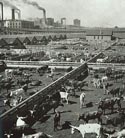Jungle Name-Check
100 Years Later, the Food Industry Is Still "The Jungle"
Nothing in “The Jungle” sticks with the reader quite like what went into the sausages. There was the rotting ham that could no longer be sold as ham. There were the rat droppings, rat poison and whole poisoned rats. Most chilling, there were the unnamed things “in comparison with which a poisoned rat was a tidbit.”
Upton Sinclair wrote “The Jungle” as a labor exposé. He hoped that the book, which was billed as “the ‘Uncle Tom’s Cabin’ of wage slavery,” would lead to improvements for the people to whom he dedicated it, “the workingmen of America.” But readers of “The Jungle” were less appalled by Sinclair’s accounts of horrific working conditions than by what they learned about their food. “I aimed at the public’s heart,” he famously declared, “and by accident I hit it in the stomach.”
“The Jungle,” and the campaign that Sinclair waged after its publication, led directly to passage of a landmark federal food safety law, which took effect 100 years ago this week. Sinclair awakened a nation not just to the dangers in the food supply, but to the central role government has to play in keeping it safe. But as the poisonings of spinach eaters and Taco Bell customers recently made clear, the battle is far from over — and in recent years, we have been moving in the wrong direction. . . .
Nothing in “The Jungle” sticks with the reader quite like what went into the sausages. There was the rotting ham that could no longer be sold as ham. There were the rat droppings, rat poison and whole poisoned rats. Most chilling, there were the unnamed things “in comparison with which a poisoned rat was a tidbit.”
Upton Sinclair wrote “The Jungle” as a labor exposé. He hoped that the book, which was billed as “the ‘Uncle Tom’s Cabin’ of wage slavery,” would lead to improvements for the people to whom he dedicated it, “the workingmen of America.” But readers of “The Jungle” were less appalled by Sinclair’s accounts of horrific working conditions than by what they learned about their food. “I aimed at the public’s heart,” he famously declared, “and by accident I hit it in the stomach.”
“The Jungle,” and the campaign that Sinclair waged after its publication, led directly to passage of a landmark federal food safety law, which took effect 100 years ago this week. Sinclair awakened a nation not just to the dangers in the food supply, but to the central role government has to play in keeping it safe. But as the poisonings of spinach eaters and Taco Bell customers recently made clear, the battle is far from over — and in recent years, we have been moving in the wrong direction. . . .


1 Comments:
Ignorance is bliss, I suppose. I stopped eating beef after I read Fast Food Nation in 2004, which is just as well because I never really enjoyed beef anyway. However, I do love chicken, and I hate to think about how gross actual chickens are... and most of us are so far removed from our food's origins that we don't have to think about it. It's really pretty sick.
I'm still in chapter 6 of The Jungle. School reading slowed my progress at first, but it's hard to motivate myself to read this stuff over winter break... it's depressing. I'd rather enjoy my holiday eating in peace! ;)
Post a Comment
<< Home